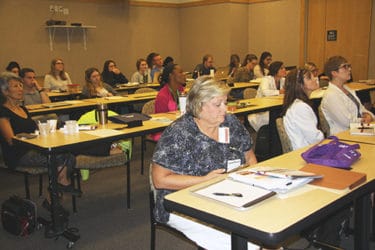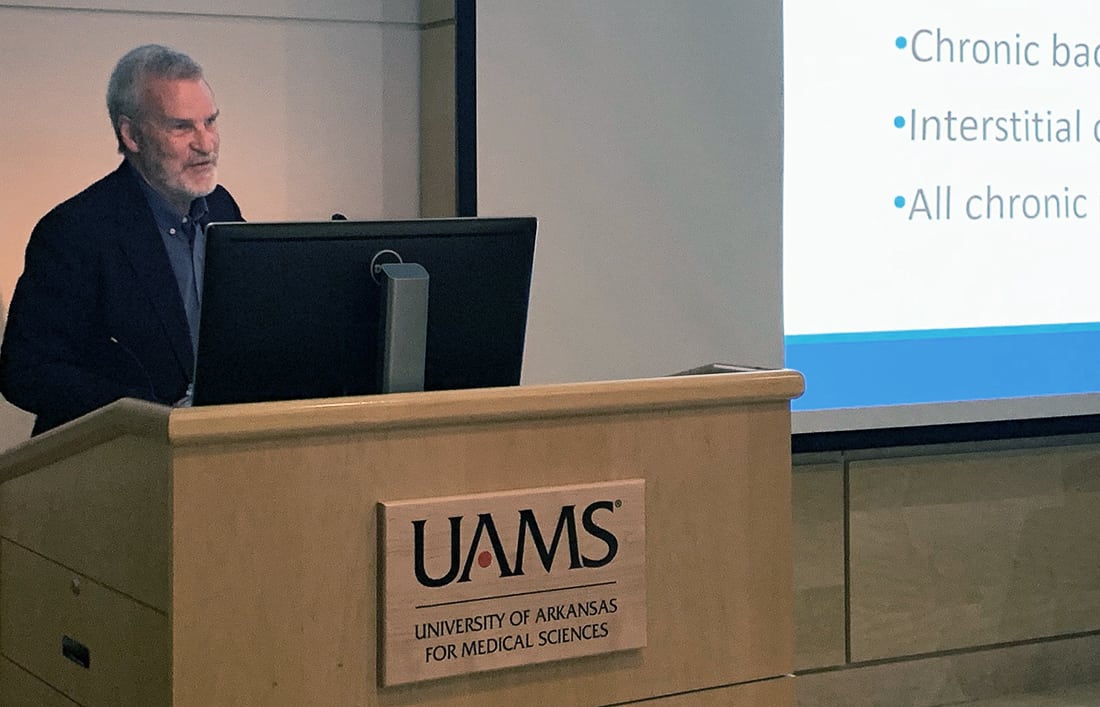Geriatrics Update Speaker Gives Alternatives to Opioids in Pain Management
| Like many physicians in the 1990s, Don Teater, M.D., M.P.H., was told that the medical community was not treating pain well enough, and like many of his peers he began prescribing more opioids in a good-faith effort to correct that.
Teater was one of the guest speakers at the 20th annual Geriatrics and Long-term Care Update held Sept. 19-21 at UAMS.

More than 120 people attended the conference, which include about 60 speakers and presentations over three days.
Nationwide, at about the time Teater was stepping up his prescribing of opioids, enough of the drug was being prescribed for every man, woman and child in the United States to receive 96 milligrams in morphine equivalents. By 2015, it had jumped up to 640 milligrams per person per year and become what many are calling an “opioid crisis” of addiction and overuse.
“Much of my life now is talking about how we have better pain treatments than opioids and how the opioids are causing a lot of problems,” Teater said. “I think that’s true for mature adults as well as youngsters.”
Teater is a North Carolina-based family medicine physician who in 2016 served as lead facilitator on the Centers for Disease Control and Prevention expert panel that developed the guidelines for prescribing opioids for chronic pain.
“We have been treating pain the wrong way, and usually, opioids will make the chronic pain worse,” Teater said. “By giving them opioids, we are not helping to relieve their pain. They may have some initial improvement, but as time goes on their pain gets worse because of the opioid medication.”
He said suffering is the “emotional aspect” of pain. Often, prescribers will write a prescription for a patient who is experiencing a “three” on a 1-to-10 pain scale and who is “freaking out” but not for the patient who is at an “eight” and stoically coping with it.
Physicians and nurses often add to that suffering by as much as 20%, in telling patients that “something will hurt,” Teater said. That contributes to a patient thinking more negatively about their discomfort or pain.
Instead, when communicating with and treating patients, he said health care professionals need to always consider the three major components of pain: the sensory, the emotional and the cognitive.

An overflow room allowed students and faculty to listen and look in on conference presentations through a live video feed outside the auditorium at the Reynolds Institute.
A study published a few years ago in JAMA, the Journal of the American Medical Association, examined the cases of 600 patients who had lower back pain and had not had surgery. Researchers used radio frequency denervation to “kill” the pain receptor nerves in the backs of half of those patients, Teater said.
“There was no difference in pain between the two groups, even though half didn’t have receptor nerves anymore,” he said. “That’s because the process was going on in their brain. The more they worry about their pain the more they suffer. It’s all being driven by the brain.”
One alternative to opioids is simply getting people to think about their pain differently. In the past, pain was viewed as just a part of life, but now as a culture we expect an almost pain-free life, Teater said.
In a study of the effectiveness of pain medications, patients were asked which medications provided them with at least 50% pain relief. Teater said only 21% of patients said Oxycodone (an opioid medication) did while 62% reported relief of 50% or greater from a combination of 200 milligrams of ibuprofen and 500 milligrams of acetaminophen.
Duke University Hospital in Durham, North Carolina, no longer uses any opioids to treat patients for post-surgical pain. Instead, physicians and nurses there treat them with multiple doses of non-opioid pain medications like acetaminophen. Teater said patient satisfaction has soared; 77% of their patients are walking within one day after surgery and fall accidents have declined. Because opioids can depress the immune system, complications due to infections have also decreased.
Throughout the three days, conference speakers, presentations and expert panels covered a range of important topics, from dementia and oral health to culinary medicine and stroke care. More than 120 people attended the conference, which was sponsored by UAMS, Arkansas Medical Society, the Arkansas Office of the Drug Director, Arkansas BlueCross BlueShield and Arkansas Department of Human Services.
The conference has also been supported annually by Jeanne Wei, M.D., Ph.D., executive director of the UAMS Donald W. Reynolds Institute on Aging, who ensures the event provides the latest information to physicians and other health professionals, as well as home health caregivers to the aging population.
“Through formal surveys and informal, face-to-face conversations, we know that for two decades attendees have discovered real value in the information presented at these conferences,” Wei said. “Dr. Teater’s presentation is just one of several solid examples of that. Our speakers always have communicated the most recent, practical knowledge to professionals directly involved in senior care, not abstract theory.”
